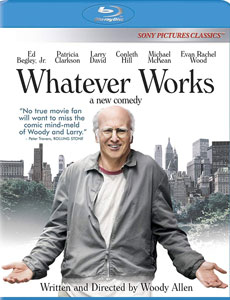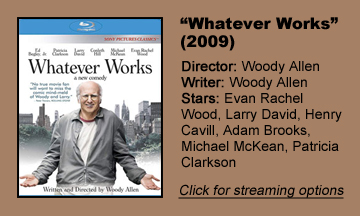As Boris in “Whatever Works” (2009), it’s no surprise that Larry David comes off as a mix of his “Curb Your Enthusiasm” character (which is himself) and Woody Allen (who writes and directs, and would normally cast himself in the role). Boris is neurotic, and at one point he comments that “I love the way these pants fit,” but he generally has a more macro view of the world than the minutia-obsessed Larry.
An unusual love match
We know we’ll get neuroses-driven analyses of some aspect(s) of life from New York-based characters in an Allen movie, but the pleasure, of course, is that we don’t know the specifics from movie to movie or scene to scene. The premise of “Whatever Works” is that divorced curmudgeon Boris finds runaway Southern waif Melody (Evan Rachel Wood) on his stoop, and a “Pygmalion”-type story ensues.
The film – being in the cranked-out Allen style – doesn’t really sell a massive transition for Melody. After she bathes, she essentially completes her physical transformation from a dirty street dweller to the beautiful young woman she is.
The humor is more about the change in her thought process, and Allen’s keystrokes lean more toward realistic than fantastical on this count.
Melody is dim-witted at first, unable to recognize that Boris is being sarcastic when he says he acquired his limp playing for the Yankees. As “Whatever Works” progresses over the span of a few years, she becomes “smarter” by taking all of Boris’ negative theories about humanity to heart, yet a lot of the humor still comes from her dearth of intelligence.
Melody’s bizarre dichotomy
Thus we have the bizarre dichotomy of an innocent, dim Southern belle who presents an incongruously thoughtful, if dark, view of the world. It’s never not funny that Melody fits a cultural stereotype but spouts things that don’t fit with it, such as her earnest appeal to her mother (Patricia Clarkson) and father (Ed Begley Jr.) that they are wasting their time praying because there is no God.
“Whatever Works” gradually gets more absurd, but mostly a viewer gets caught up in the consistently smile-worthy (rarely laugh-out-loud) humor. Many scenes are punctuated with a winning zinger. There’s a lot of dark humor, too, including the suicidal tendencies of Boris, but with David doing his usual smirking throughout the performance, I admit I smiled even when he tries to kill himself.
Some viewers might find it offensive on the surface that Boris and Melody get married, given that he’s decades older. But although Melody is obviously young and cute, the film doesn’t play up the lascivious angle.
A feel-good movie after all?
A viewer could either accept that love comes in all forms, which is the film’s theme, or could see the marriage as one of the story’s absurdities. This mismatched couple is regularly commented on by observers, and the ways in which Boris and Melody don’t click provide fodder for much of the humor.

Allen frames the movie with Boris talking to the theater of moviegoers and giving an opening warning that this isn’t “the feel-good movie of the year.” Interestingly, 2009 was also the year of “(500) Days of Summer,” with its warning that “This isn’t a love story.” In the latter case, it’s literal, but “Whatever Works” isn’t so cut and dried.
It’s certainly not a traditional feel-good story, but by the time it’s over – everyone having found happiness (and even love, which Boris has little faith in) — a case could be made that it is a feel-good movie. If so, these people’s delightfully funny winding paths to happiness make “Whatever Works” more than a “whatever” entry in the genre.


